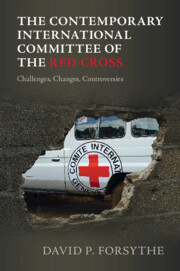Book contents
- The Contemporary International Committee of the Red Cross
- The Contemporary International Committee of the Red Cross
- Copyright page
- Dedication
- Contents
- Photographs
- Preface: Who and Why
- 1 The Contemporary ICRC and Its Critics
- 2 The ICRC and the Global Humanitarian System
- 3 History
- 4 History
- 5 The Red Cross Movement
- 6 The Red Cross Movement
- 7 ICRC Relations with Bern
- 8 ICRC Relations with Bern
- 9 Humanitarians and Business
- 10 Humanitarians and Business
- 11 Interpreting the Mandate
- 12 Interpreting the Mandate
- 13 Has the Traditional Focus Been Lost?
- 14 Has the Traditional Focus Been Lost?
- 15 ICRC Governance and Management
- 16 ICRC Governance and Management
- 17 Conclusion
- 18 Conclusion
- Epilogue
- Annex
- Index
16 - ICRC Governance and Management
Part II – On Down the Line
Published online by Cambridge University Press: 01 February 2024
- The Contemporary International Committee of the Red Cross
- The Contemporary International Committee of the Red Cross
- Copyright page
- Dedication
- Contents
- Photographs
- Preface: Who and Why
- 1 The Contemporary ICRC and Its Critics
- 2 The ICRC and the Global Humanitarian System
- 3 History
- 4 History
- 5 The Red Cross Movement
- 6 The Red Cross Movement
- 7 ICRC Relations with Bern
- 8 ICRC Relations with Bern
- 9 Humanitarians and Business
- 10 Humanitarians and Business
- 11 Interpreting the Mandate
- 12 Interpreting the Mandate
- 13 Has the Traditional Focus Been Lost?
- 14 Has the Traditional Focus Been Lost?
- 15 ICRC Governance and Management
- 16 ICRC Governance and Management
- 17 Conclusion
- 18 Conclusion
- Epilogue
- Annex
- Index
Summary
Continuing the analysis in the previous chapter, here the author gives attention especially to the rapid growth of staff with its central question of whether a larger, internationalized staff will kill the goose that laid the golden egg. The chapter thus addresses whether more centralized and top-down management of multi-national personnel, evident in recent years, will stifle the creativity and accomplishments of heads of delegations and other staff members who in the past largely built the reputation of the organization. Some now believe the ICRC is no longer characterized by timely, flexible, and effective assistance and protection in its field activities. The chapter also studies the important subject of digital transformation at the Geneva headquarters and in the field. These two chapters on governance and management, especially difficult to construct, are central to understanding the ICRC in contemporary times.
Keywords
- Type
- Chapter
- Information
- The Contemporary International Committee of the Red CrossChallenges, Changes, Controversies, pp. 341 - 364Publisher: Cambridge University PressPrint publication year: 2024

